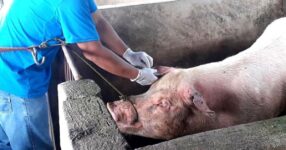
City ASF monitoring intensified amid reported cases
THE City Veterinarian’s Office (CVO) has ramped up monitoring and surveillance in Davao City following positive tests for African Swine Fever (ASF) in neighboring areas.
Dr. Ma. Corazon Sepulveda, officer-in-charge of CVO, explained in a radio interview on Davao City Disaster Radio on Monday morning, September 2, 2024, that the Davao City Animal Disease Diagnostic Laboratory (DCADDL) is actively engaged in monitoring and responding to reports of sick hogs.
“Pag po meron pong balita na meron pong may sakit agad po yang pupuntahan at kukuhanan ng dugo (If there are reports of sick hogs, we immediately investigate and take blood samples),” she said.
She noted that Davao City is currently classified as a yellow zone or surveillance area for ASF.
While there are some cases in the city, they are limited and have been isolated. Heightened surveillance is necessary due to the high volume of foot traffic and numerous vehicles transporting hog products.
CVO also reported that neighboring areas, such as Cotabato and Panabo, have active ASF cases, prompting stricter quarantine measures in the city.
Regarding vaccines provided by the Department of Agriculture (DA), Sepulveda said they are still in the trial stage and are being administered in red zones in Luzon. Davao City, classified as a yellow zone, is not included in the trial.
The DA describes ASF as a highly contagious viral disease of pigs, which can result in high mortality in its acute form. Unlike swine flu, ASF does not affect humans or impact human health.
Previously, blood and tissue samples from swine in three barangays in Sta. Maria, Davao Occidental—Barangay San Agustin, Basiawan, and Bito—tested positive for ASF on August 8, 2024.
The province has announced protocols to control ASF, including a “Test and Destroy” procedure within a 500-meter radius of the infected area. Culled swine will be buried on-site, and if space is limited, carcasses will be transported to an alternate burial site using appropriate vehicles to prevent further spread of the virus. RGP



